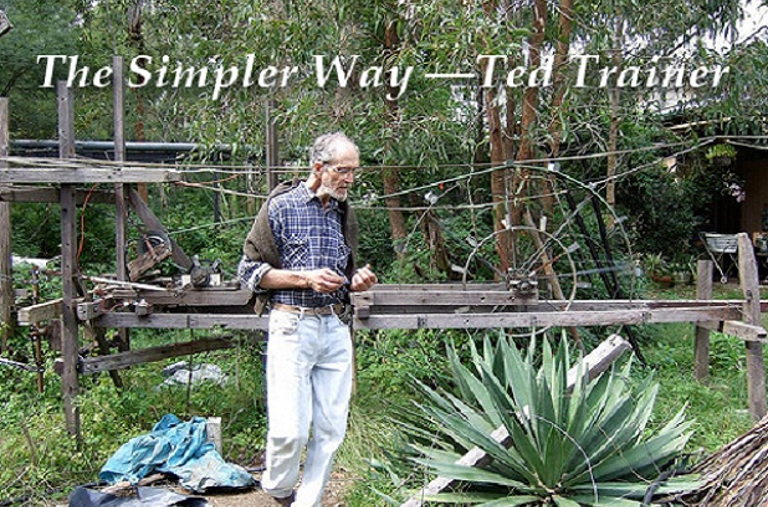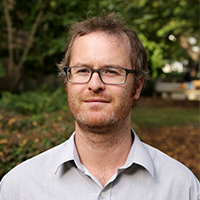 Ed. note: This piece is excerpted from Ted Trainer’s new book, The Simpler Way. You can find out more about the book and purchase either the paperback and ebook (available on a ‘pay what you can’ basis).
Ed. note: This piece is excerpted from Ted Trainer’s new book, The Simpler Way. You can find out more about the book and purchase either the paperback and ebook (available on a ‘pay what you can’ basis).
In the decade we’ve known him, and as editors of this volume, we have enjoyed developing a close intellectual and personal relationship with Ted Trainer. It is safe to say that our joint email exchanges, discussing every aspect of Ted’s ‘Simpler Way’ perspective, would constitute another entire book. While at times we have challenged and disagreed with him, we have always appreciated Ted’s openness to critical feedback and his evident intellectual integrity. Beyond our mutual friendship, we also believe his writing deserves far wider dissemination and debate – especially among those concerned about sustainability and social justice issues. This is our motivation for working with Ted to bring together this anthology of some of his best essays and articles – all of which, in one way or another, argue for what he calls ‘the Simpler Way’. Most of these essays have been recently edited by Ted to bring them up to date with his current thinking and the latest empirical data.
The Simpler Way is an ‘eco-anarchist’ vision of a world where self-governing communities live materially simple but sufficient lives, in harmony with ecological limits. Central themes discussed in the following pages include a radical critique of consumer capitalism; the need for fundamental system change; and a transition theory based on building a new society from the grassroots up. Trainer also presents detailed descriptions of the Simpler Way society; explains why frugal but sufficient material living standards are necessary to live within planetary limits; and shows why technology alone is unable to resolve environmental problems. He also shares strategic advice on how to contribute positively to societal change, while also critically engaging some green and left strategies. Far from involving deprivation and hardship, Trainer argues that a Simpler Way society would enable liberation to a much higher quality of life for all.
Ted has been tirelessly putting the case for the Simpler Way since at least the publication of his 1985 book Abandon Affluence. Before being published, the manuscript was rejected by 60 publishers, but eventually gained some international recognition as an important statement of the radical deep green perspective, which was emerging particularly following the publication of the 1972 ‘Limits to Growth’ report and the subsequent increase in awareness of environmental issues. Since then, Ted has gone on to publish 12 books and a great many academic journal and popular articles, while teaching courses on the Simpler Way and related themes at the University of New South Wales (UNSW), Australia. Over his career he has also been involved in a number of other more specialised academic fields. For example, he has made a major contribution advancing the public debate around the potential limits and costs of renewable energy, having published numerous influential technical papers in leading energy journals. Demonstrating his wide breadth as a thinker, Ted did his PhD in the field of moral philosophy and has written a book on meta-ethics.
For both of us, Ted’s message is greatly enhanced by his deep personal commitment to practising what he preaches. His bush homestead in Sydney’s east is called ‘Pigface Point’, named after the plant that was, for a long time, the only thing they could get to grow in the site’s poor soils. Ted lives there along with his wife Sandra, his son Jamie and a few on-site caretakers, and for decades they have been quietly living out the Simpler Way philosophy. Throughout his career (he is now retired) Ted worked four days a week at the UNSW and the rest of the time his family has practised a rough and ready homesteader lifestyle, applying principles of self-sufficiency, frugality and ecological restoration. Since the 1940s the family has planted over 200 now large trees around the once barren house site, which is within a beautiful bush block located within 95 ha of environmentally protected forests and wetlands. In the 1980s Ted was part of a small community group that helped to protect this area from urban re-zoning proposals. Almost unique among modern academics, Ted rarely travels – he has never gone further west by land than to Bathurst (i.e., 200 km), and has flown on aircraft only five times, and never for leisure. This tends to baffle modern ears, given that travel is now widely viewed in terms of the positive opportunity it provides for personal and cultural discovery. For Ted, in a world characterised by resource scarcity and global warming, travel by plane or car is morally problematic. Given that there is so much interesting and important work to be done in his locality, however, Ted does not feel that giving up long-distance travel is a hardship or sacrifice. Ted demonstrates that one can live a full and diverse life within one’s bioregion.
Importantly, Ted has not been developing Pigface Point merely for personal use. Rather, he has worked hard to develop the site as an educational resource designed to promote the Simpler Way philosophy. Over the last few decades he has taken thousands of groups on free educational tours of the site, attempting to educate the public about global problems and the need for a Simpler Way. This is another impressive illustration of Ted’s willingness to live in accordance with his own creed – as you will see, one of Ted’s core points is that it is not enough for us to live in alternative low-consumption ways as individuals. Instead, our practical efforts to live simply and cooperatively must become the tools we use to educate people around us about the need to embark on a radical transition away from consumer-capitalist society and towards some kind of simpler way. For Ted, education lies at the heart of transitional strategy.
And yet, despite these noble efforts, and perhaps unsurprisingly, Ted’s message has struggled to find a mainstream audience. After all, he presents a bold and, in many ways, confronting case to affluent cultures immersed in the comforts and conveniences provided by consumer capitalism. In no uncertain terms, he condemns the ecological insanity and injustice generated by consumer capitalism – a social system in which most of us (at least in the Global North) are the material, if not spiritual, beneficiaries. Ted insists that the overlapping global problems we face as a species cannot be solved within capitalism because they are being generated by the fundamental systems, structures and hegemonic values of this society. Instead, he challenges us to engage in a long-term process of education and activism aimed at slowly building a radically different system within the shell of the old. But while Ted’s message is no doubt a difficult pill for many people to swallow, we believe he presents strong logical and empirical grounds for its basic validity. We invite you to carefully consider these claims as well as their implications – after all, as most people now recognise, the situation is urgent.
Importantly, Ted’s message is not just critical or negative. Much of his writing is concerned with persuading us that the Simpler Way offers a viable and attractive alternative which we can work on today, starting now in the cities, towns and neighbourhoods where we live. In this Ted draws partly on his own experience as a homesteader, which gives him the confidence to know that it would be easy for us to design and run small settlements that are highly self-sufficient, sustainable and delightful. Aside from his own experience, Ted draws on the practices, ideas and wisdom of a diverse range of individuals, groups and social movements around the world who, in a variety of ways, are seeking to build alternatives to consumer capitalism.
But readers beware! Against the grain of a post-modern and cynical age, Ted is prepared to make unfashionably universalistic claims. He insists that the Simpler Way – if not in all the specific details he describes, then at least its basic framework – is not merely one potential pathway among many. Rather, he argues, something like the vision he describes is the only broadly viable alternative if humanity is to avoid catastrophic breakdown and descend into a new dark age. For Ted, another world is indeed possible; but it is also an urgent necessity. He challenges all of us who are concerned about eco-justice to work hard to realise it.
In this monumental task, he offers strong strategic proposals for activists to consider. A great merit of his work is his willingness to offer recommendations and guidelines for action, in order to give us the best hope of success. As you will see, his ideas on how we might successfully transition to the Simpler Way explicitly challenge many of the ideas which prevail within both the political Left and mainstream environmental circles today. But again, it is precisely because Ted makes such bold and challenging arguments that we feel this volume is critically important. We encourage you to think hard about his strategic proposals and their implications for your own activism, especially if you agree with his basic diagnosis of our global predicament.
The material for this book derives from a range of sources, including: peer reviewed journals, informal website articles, extracts from Ted’s published books and the ‘Simpler Way’ website that Ted maintains (see http://thesimplerway.info). It should be noted most of the material has been revised and updated by Ted specifically for this publication. This means the present anthology is best interpreted not as a collection of Ted’s old and new writing, but rather as an up-to-date statement of his most important ideas and arguments, especially as they relate to the Simpler Way. While claims and arguments are supported with evidence, the primary purpose of this volume is not to weigh the reader down with references and citations but to introduce the reader to a radically new way of seeing the world and our place in it. Further evidential support and more details on the vision can be accessed at the link provided above.
We also note that there is some deliberate repetition of issues in places throughout this book. We defend such repetition on two grounds: first, so that the essays can stand on their own, meaning that readers can follow the essential lines of argument whichever order they read the essays (although front to back is recommended); secondly, the repetition of unsettling and controversial perspectives can help disrupt conventional thoughts and assumptions, which is required in order to understand why radical conclusions are often drawn about the global predicament and the nature of any coherent response.
The arrangement of this anthology has been organised as follows. Part One provides a short overview of the Simpler Way perspective. The remaining essays in the book then flesh out this perspective in greater detail. Part Two is made up of seven essays which outline the nature of the global predicament and the major global problems being generated by consumer capitalism. Part Three consists of two critical essays which call into question dominant ‘techno-fix’ approaches to resolving global problems. Part Four contains five essays outlining the alternative Simpler Way societal vision which Ted proposes. Part Five contains a selection of Ted’s writing on the question of transitional strategies and his critical analysis of existing theories and practices of change. Finally, in Part Six, we have included an interview with Ted, in which we, as editors, ask him some challenging questions about his perspective that may also occur to you as you read this book.
We hope, like us, you are challenged, provoked and inspired by Ted’s writings.
Teaser photo credit: Ted Trainer and the Simpler Way, Samuel Alexander, The Permaculture Research Institute






